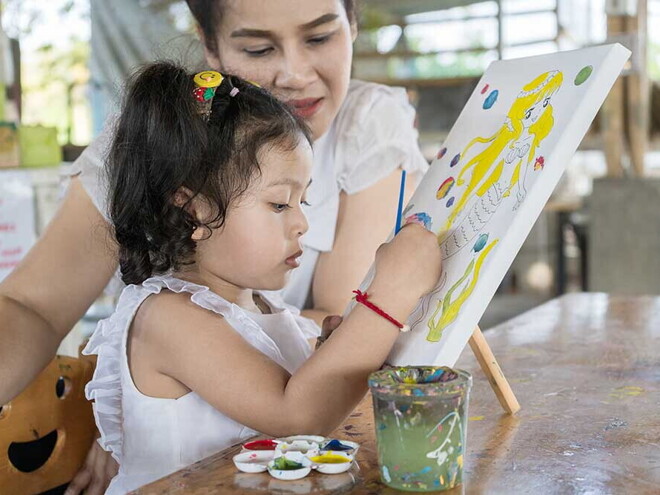
Discover How Simulation Can Nurture Your Gifted Kid’s Creativity
Unlocking your gifted kid’s creativity involves more than just engaging them with art supplies or educational games. By fostering a two-way interaction known as "serve and return," you can significantly contribute to their creative and cognitive development. This method is vital during early brain development, allowing your kid to refine skills that will serve as the building blocks for their future creative endeavors.
Understanding Serve and Return
Serve and return is a crucial element in the development stages of a kid's brain. It’s a responsive interaction where the kid "serves" by expressing a need or interest, and the adult "returns" by engaging appropriately1. This approach enhances brain development in early childhood, strengthening neural connections that are pivotal for creativity and problem-solving2. By actively participating in these exchanges, parents not only foster creative and independent thinking but also contribute to cognitive development.
Encouraging Creativity Through Communication
Language plays an integral role in brain development stages, and serve and return is an effective way to encourage language development and self-expression3. Communicating emotions with your kid and using active listening techniques allows them to understand and articulate their feelings, enhancing their creative expression. Discussing a kid's intense focus and high engagement levels during family discussions and using role-playing real-life situations can also prompt reflective thinking4.
Interactive Play and Artistic Expressions
Interactive play, including question and answer sessions and artistic expressions, offers practical ways to engage in serve and return. These activities stimulate areas of the brain responsible for imagination and creativity, reinforcing skills learned during early brain development5. Role-playing or using online educational resources and learning games for children can illustrate how to manage conflicts and improve social skills for school6.
The Role of Educational Technology
Educational apps and games for children supplement traditional serve and return activities, offering interactive platforms that enhance learning and creative thinking. However, it's vital for parents to monitor progress and set parent control on tech and social media usage to ensure quality engagement7.
Promil and Supporting Development
Promil's formulation is specifically designed to support both fine and gross motor skill development, promote growth, and provide immunity benefits with 4 more brain nutrients (MOS+, DHA, Choline and Lutein) to support their 4 brain developmental milestones of Focus, Memory, Language & Problem Solving.
Additionally, Promil Gold has Alpha-Lipids, containing the five major phospholipids helping to advance your Gifted Kid’s language and communication skills.
The serve and return interaction is a powerful tool in boosting creativity and cognitive development. By focusing on effective communication, interactive play, and utilizing educational technology judiciously, parents can cultivate an environment that not only enhances their kid’s creativity but also prepares them for future challenges.
Sources
1. Center on the Developing Child at Harvard University. (2016). *Serve and Return.* Retrieved from https://developingchild.harvard.edu
2. National Scientific Council on the Developing Child. (2015). *Supportive relationships and active skill-building strengthen the foundations of resilience.* Cambridge, MA: Center on the Developing Child, Harvard University.
3. Weisleder, A., & Fernald, A. (2013). *Talking to Children Matters: Early Language Experience Strengthens Processing and Builds Vocabulary.* Psychological Science, 24(11).
4. Vygotsky, L. S. (1978). *Mind in Society: The Development of Higher Psychological Processes.* Cambridge, MA: Harvard University Press.
5. Singer, D. G., & Singer, J. L. (2005). *Imagination and Play in the Electronic Age.* Harvard University Press.
6. Hirsh-Pasek, K., Golinkoff, R. M., Berk, L. E., & Singer, D. (2009). *A Mandate for Playful Learning in Preschool: Presenting the Evidence.* Oxford University Press.
7. Livingstone, S., & Smith, P. K. (2014). *Annual research review: Harms experienced by child users of online and mobile technologies: The nature, prevalence and management of sexual and aggressive risks in the digital age.* Journal of Child Psychology and Psychiatry, 55(6), 635–654.









